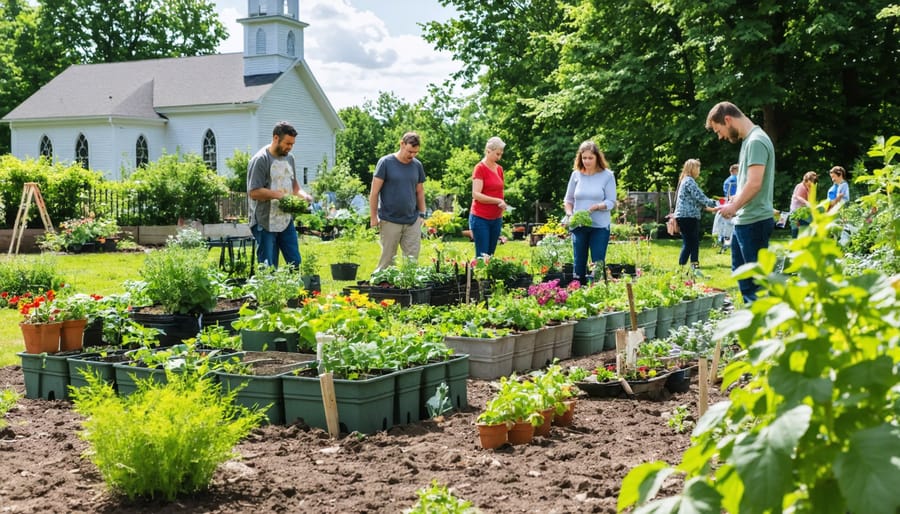Environmental ethics, deeply rooted in God’s original mandate for humanity to be stewards of His creation, stands at the intersection of faith, responsibility, and our relationship with the natural world. In Genesis 1:28, God entrusted humanity with dominion over the earth – not as exploiters, but as careful caretakers of His masterpiece. This divine calling challenges us to examine how our actions impact the delicate balance of God’s creation and our responsibility to protect it for future generations.
As Christians, our approach to environmental ethics flows from understanding that all creation glorifies its Creator (Psalm 19:1) and that our role as stewards requires wisdom, compassion, and intentional action. Just as Adam was placed in the Garden of Eden to “work it and take care of it” (Genesis 2:15), we are called to be thoughtful guardians of our planet’s resources, biodiversity, and natural systems.
This ethical framework extends beyond mere conservation to encompass questions of justice, sustainability, and our obligations to both our global neighbors and future generations. When we consider environmental ethics through a biblical lens, we discover that caring for creation is not just about preserving nature – it’s about honoring God, loving our neighbors, and fulfilling our divine mandate as stewards of His world.
Let us explore how we can align our environmental decisions with biblical principles and respond faithfully to this sacred responsibility.
Biblical Foundations of Environmental Stewardship

Creation as God’s Gift
The foundation of environmental ethics in Christian thought begins with understanding that all creation is a precious gift from God. In the Genesis creation stories, we learn that God carefully crafted every aspect of our world and declared it “good.” This divine assessment establishes the inherent value of creation beyond its utility to humankind.
When God entrusted humanity with dominion over creation (Genesis 1:28), He wasn’t granting permission for exploitation, but rather appointing us as stewards of His masterpiece. This sacred responsibility calls us to tend and care for the earth with the same love and wisdom with which God created it. Just as a precious family heirloom is passed down with the expectation of careful preservation, God has given us the earth with the understanding that we will protect and nurture it.
The psalmist reminds us that “The earth is the Lord’s, and everything in it” (Psalm 24:1). This fundamental truth shapes our approach to environmental ethics, reminding us that we are caretakers, not owners. Our role is to manage God’s creation in a way that honors His design, sustains its beauty and function, and ensures its preservation for future generations who will also experience God’s love through the wonders of His creation.
The Fall and Environmental Impact
The entrance of sin into the world through Adam and Eve’s disobedience marked a profound shift in humanity’s relationship with God’s creation. As described in Genesis 3, this pivotal moment not only fractured our connection with God but also disrupted the harmonious relationship we were meant to have with the natural world.
Scripture tells us that the ground itself was cursed as a consequence of the Fall (Genesis 3:17-19). What was once meant to be joyful stewardship became toil and struggle, transforming humanity’s role from peaceful gardeners to laborers contending with thorns and thistles. This broken relationship has manifested in various ways throughout history, leading to environmental exploitation, resource depletion, and ecological degradation.
The effects of the Fall continue to impact our interaction with creation today. We see this in our tendency to prioritize short-term gain over long-term sustainability, in our struggle to balance development with conservation, and in the environmental challenges that affect communities worldwide. However, as Christians, we recognize that while sin has damaged our relationship with creation, it hasn’t eliminated our responsibility to care for it.
Understanding this fallen state helps us approach environmental ethics with both humility and hope. While we acknowledge our role in environmental degradation, we also embrace our calling to be agents of restoration, working toward healing the wounds in God’s creation while awaiting the ultimate renewal promised in Christ.
Core Principles of Christian Environmental Ethics

Stewardship vs. Dominion
In understanding our relationship with God’s creation, it’s crucial to distinguish between stewardship and dominion. Genesis 1:28 grants humans dominion over the earth, but this divine mandate is often misinterpreted. True Christian environmental stewardship reflects God’s heart for His creation, calling us to be careful managers rather than exploitative rulers.
When God placed Adam in the Garden of Eden, He instructed him to “work it and take care of it” (Genesis 2:15). This original assignment reveals God’s intention for humanity to be stewards who nurture and protect His creation. As stewards, we are entrusted with the responsibility to manage resources wisely, considering both present needs and future generations.
The concept of dominion, properly understood, doesn’t grant us unlimited authority to exploit creation. Instead, it calls us to exercise leadership that reflects God’s character – loving, wise, and sustaining. Just as Christ demonstrated servant leadership, our dominion should be expressed through responsible care and protection of the environment.
This understanding transforms how we approach environmental ethics. Rather than seeing nature as something to conquer, we recognize our role as caretakers of God’s creation, working to preserve and enhance its beauty and functionality for His glory and the benefit of all creation.
Care for the Poor and Environmental Justice
Environmental ethics cannot be separated from our Christian calling to care for the poor and vulnerable. As followers of Christ, we understand that environmental degradation disproportionately affects those with the least resources to adapt or recover. When we examine Jesus’s call to care for creation, we see it intrinsically linked with His commands to love our neighbors and care for the least of these (Matthew 25:40).
The Bible repeatedly emphasizes God’s special concern for the poor and marginalized. Environmental justice recognizes that pollution, climate change, and resource depletion often impact vulnerable communities first and most severely. When toxic waste facilities are located in low-income neighborhoods or when natural disasters devastate communities without adequate infrastructure, we witness the intersection of environmental and social justice.
As Christians, we are called to be advocates for both the earth and its inhabitants, especially those whose voices often go unheard. This dual commitment reflects Christ’s example of caring for both physical and spiritual needs. Clean air, safe water, and healthy ecosystems are not luxuries but basic necessities that reflect God’s provision for all His children. When we work to protect the environment, we simultaneously fulfill our mandate to love our neighbors and serve as faithful stewards of God’s creation.
Through mindful consumption, advocacy for sustainable practices, and support for environmental justice initiatives, we can demonstrate Christ’s love in tangible ways that benefit both people and planet.
Future Generations and Legacy
The Bible teaches us that God’s creation is not just a gift for our present use, but a precious inheritance to be preserved for future generations. In Psalm 145:4, we read, “One generation shall commend your works to another, and shall declare your mighty acts,” reminding us of our responsibility to be good stewards of God’s creation across generations.
When we consider environmental ethics from a biblical perspective, we must acknowledge that our actions today have lasting consequences for those who will come after us. Just as God provided abundantly for His people in the past, He expects us to ensure that future generations can experience the fullness of His creation. This principle is reflected in Leviticus 25:23-24, where God instructs His people about land stewardship: “The land shall not be sold in perpetuity, for the land is mine. For you are strangers and sojourners with me.”
Our legacy as Christians should reflect God’s care for His creation. We are called to be wise stewards who consider the long-term impacts of our environmental choices. This means making decisions that balance our present needs with the preservation of natural resources, biodiversity, and ecological health for our children and grandchildren. By embracing this responsibility, we demonstrate our love for God, our neighbors, and the generations yet to come, fulfilling our role as faithful caretakers of God’s magnificent creation.
Practical Application for Today’s Christians
Individual Actions and Choices
As Christians, we are called to be good stewards of God’s creation through our daily choices and actions. Each of us can make meaningful contributions to environmental care that reflect our faith and responsibility to protect what God has entrusted to us.
Begin by examining your consumption habits through a biblical lens. Consider the wisdom of Proverbs 21:20, which praises the wise who conserve their resources. Simple actions like reducing waste, reusing items when possible, and being mindful of our purchases can demonstrate responsible stewardship.
Practice energy conservation in your home by turning off unused lights, adjusting your thermostat mindfully, and choosing energy-efficient appliances. These choices not only care for creation but also demonstrate good stewardship of your financial resources.
Consider adopting sustainable transportation habits when possible. Walking, cycling, or carpooling can reduce your environmental impact while creating opportunities for fellowship and community building.
In your yard or garden, choose native plants that support local ecosystems and require less water. Genesis 2:15 reminds us that God placed humans in the garden to “work it and take care of it.” Creating wildlife-friendly spaces in our surroundings honors this calling.
Support local farmers and choose sustainably produced foods when possible. This not only reduces environmental impact but also helps build strong community relationships and honors those who work the land.
Most importantly, pray for wisdom in making environmentally conscious decisions and share your journey with others in your faith community. Remember that small, consistent actions, when multiplied across the body of Christ, can have a significant impact on God’s creation.

Community and Church Initiatives
Christian communities play a vital role in addressing environmental challenges through collective action and shared stewardship. Churches across denominations are increasingly participating in faith-based environmental initiatives that demonstrate God’s love for creation and our responsibility to protect it.
Local congregations can establish creation care ministries that organize educational workshops, community clean-up events, and sustainable practices within church facilities. These initiatives might include installing solar panels, implementing recycling programs, or creating community gardens that provide fresh produce for food banks while teaching sustainable agriculture practices.
Scripture reminds us that “the earth is the Lord’s, and everything in it” (Psalm 24:1), calling us to work together as stewards of God’s creation. Churches can partner with environmental organizations to amplify their impact, joining forces on conservation projects, habitat restoration, and advocacy for responsible environmental policies that protect God’s creation.
Youth groups and Sunday school programs can incorporate environmental education into their curriculum, helping young believers understand their role in caring for God’s earth. Simple activities like nature walks, gardening projects, and waste reduction challenges can help build environmental awareness while strengthening faith communities.
Prayer groups and Bible studies can focus on creation care themes, exploring how environmental stewardship connects to our Christian values of love, justice, and responsibility. By working together, church communities can demonstrate Christ’s love through practical environmental action while inspiring others to join in the sacred duty of protecting God’s creation for future generations.
As Christians, we are called to be faithful stewards of God’s creation, a responsibility that stems directly from His command in Genesis 1:28. Our exploration of environmental ethics reveals that this calling goes far beyond simple conservation – it’s an integral part of our worship and witness to the world. Through understanding and embracing our role as caretakers of Creation, we demonstrate our love for God and our neighbors, both present and future.
The Bible teaches us that all of creation groans for redemption (Romans 8:22), and we have the privilege of participating in God’s restorative work. This isn’t just about preserving nature; it’s about actively working toward the flourishing of all God’s creation. As we’ve seen, environmental stewardship is deeply rooted in biblical principles of justice, compassion, and responsibility.
Now is the time for us to move from understanding to action. We can start by making simple changes in our daily lives – reducing waste, conserving energy, and being mindful consumers. Our churches can lead by example through sustainable practices and teaching environmental stewardship as part of discipleship. Each small step we take reflects our commitment to honor God through caring for His creation.
Let us remember that environmental ethics isn’t just about following rules or joining a movement – it’s about living out our faith in practical ways that glorify God. As we face growing environmental challenges, may we be known as people who took seriously our calling to be good stewards, who acted with wisdom and love, and who worked to preserve and protect the magnificent world God has entrusted to our care.
Together, let us embrace this sacred responsibility with hope, faith, and determination, knowing that our efforts to care for creation are acts of worship to our Creator.
